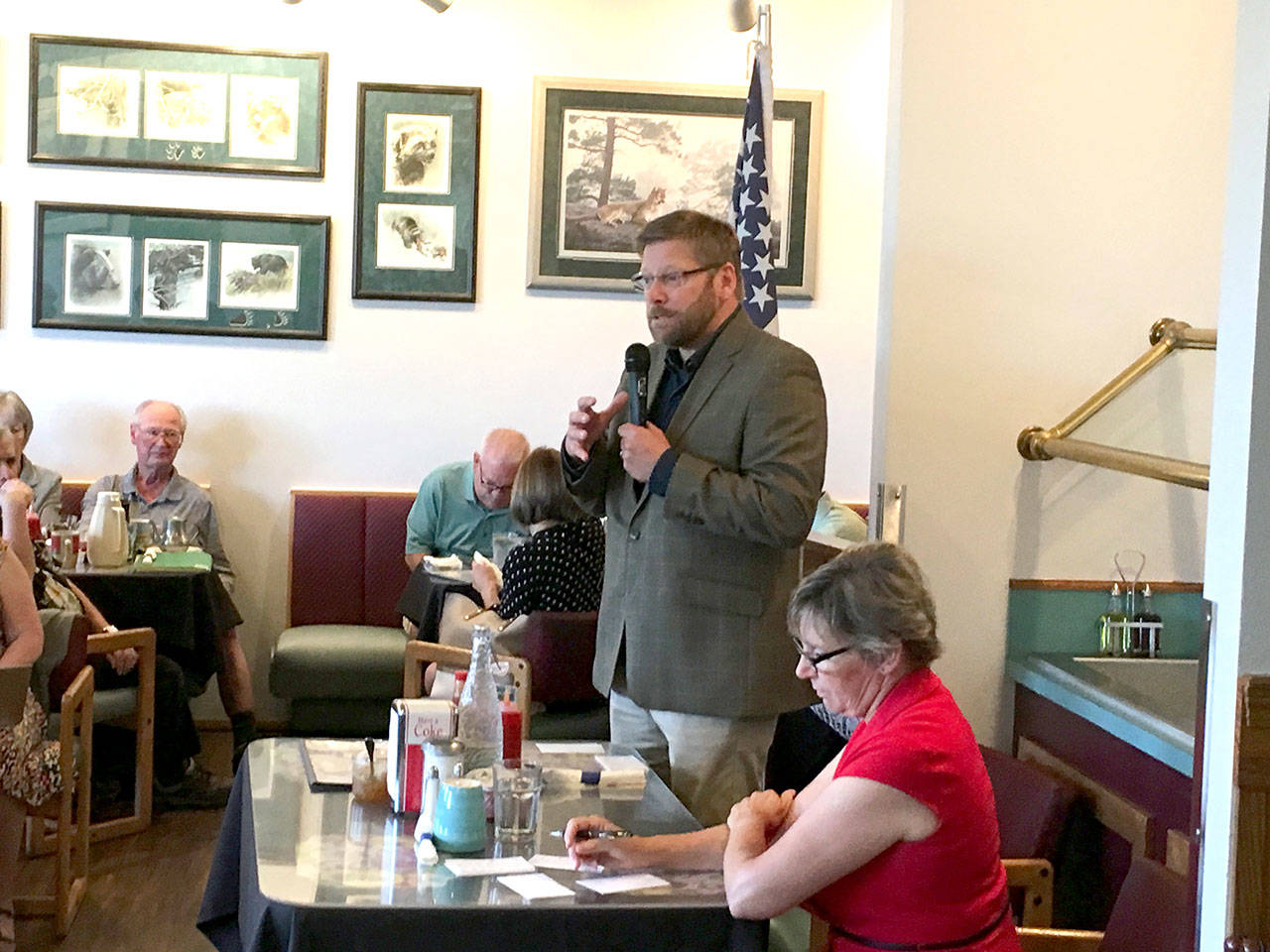PORT ANGELES — State Rep. Mike Chapman and challenger Jodi Wilke differed on guns, jobs and taxes in a lively political forum Tuesday.
Chapman, D-Port Angeles, and Wilke, a Port Townsend Republican, are vying in August and November for one of two legislative seats in the 24th District, which covers the North Olympic Peninsula.
Wilke, a licensed practical nurse and political newcomer, criticized her opponent in a Port Angeles Business Association meeting for supporting a 30-cents-per-$1,000-valuation property tax cut because it was funded by the rainy-day surplus.
“I’m not against tax cuts, of course,” Wilke said at the PABA breakfast meeting at Joshua’s Restaurant.
“Let’s get that straight. What I am against is using smoke and mirrors to pay for those tax cuts.”
Wilke said the decision to redirect tax revenue that would have gone to the state budget stabilization account ran afoul of the Washington Constitution.
“In our Legislature, we elect people to do a job, and the job is defined by the constitution of our state,” Wilke said. “That is not the way that was handled.”
Chapman defended the bipartisan vote to lower the state property tax from $2.70 per $1,000 of assessed valuation to $2.40 per $1,000. The one-time tax cut followed the largest property tax increase in the state’s history, Chapman said.
“If that’s what I’m criticized for — cutting your property taxes — then that is criticism that I welcome, and I ask you to bring it on,” Chapman told Wilke.
With basic education fully funded amid a booming economy, the Legislature had “excess revenues that we just decided to give back to you, the taxpayer, as opposed to putting it into the rainy-day fund, which has more money in it today than ever before,” Chapman said.
“I cut your taxes,” Chapman said. “Yes I did.”
The candidates were asked about a state ballot initiative that would raise the minimum age to buy semi-automatic weapons from 18 to 21. The minimum age to purchase a handgun is already 21.
Chapman said he co-sponsored legislation that would have added high-capacity weapons to the must-be-21 law and required background checks for the purchase of semi-automatic weapons.
“If you can’t buy a pistol until you’re 21, it may make some sense to say certain high-capacity rifles maybe should be limited to 21, but that’s going to be before the people,” Chapman said.
Wilke said she opposed raising the minimum age for firearms. Doing so would not stop mass shootings, Wilke said.
“This problem is not a problem of guns,” Wilke said.
“This problem is a mental problem. It’s a problem of the heart. A person who is determined to get a gun, they’re going to get a gun, whether they’re 18, 16, 52, or whatever.
“I don’t think that the answer is to legislate that,” Wilke added.
“I think the answer is for society to take back the responsibility we have to raise responsible, intelligent and well-balanced human beings.”
Chapman, a former law enforcement officer who served for 16 years as a Clallam County commissioner, displayed a concealed weapons permit to the audience.
“No one can leave this room and say I’m anti-Second Amendment,” Chapman said.
“Let me make that clear to this group: Mike supports the Second Amendment, he has a concealed weapons permit and he owns firearms. I just want that clear.”
Wilke suggested that she was “more pro-Second Amendment” than her opponent, saying she presumed that Chapman would support a ban on assault weapons.
“I wouldn’t presume anything about what I believe,” Chapman told Wilke.
“I didn’t support the legislation that would ban assault weapons. I don’t believe that that would be something that our district would support.”
Wilke said she would work to modify the state Growth Management Act to decrease unemployment and increase production on the North Olympic Peninsula.
The 1990 law has “caused a lot of problems for growth and for the development of businesses,” particularly in rural areas, Wilke said.
Manufacturing centers that once thrived in Irondale and Port Hadlock would be prohibited under the Growth Management Act, Wilke said.
Chapman said the key to job growth on the Olympic Peninsula is workforce training.
He said that he and fellow 24th District state Rep. Steve Tharinger, D-Sequim, sponsored bipartisan legislation that created a rural county jobs program through public-private partnerships.
“Let’s send a message to our young kids: ‘You don’t have to leave to get a good job. We’re going to educate you for the jobs that are here,’ ” Chapman said.
Chapman touted his record in Olympia, saying he sponsored 15 bipartisan bills in his first two years, eight of which have become law.
“Bipartisanship is exactly how you get things done in Olympia for the district,” Chapman said.
Wilke said she was “uniquely qualified” for the job because of her wide range of experience in the construction, mortgage and real estate industries and experience as a single mother.
If elected, Wilke said she would work to close the economic gap between rural Washington and the Interstate 5 corridor.
“In a time when Washington state is showing some of the highest prosperity in our nation, there’s really no reason why our prosperous and resource-rich district shouldn’t be following suit,” Wilke said.
“So I intend to do something about that.”
________
Reporter Rob Ollikainen can be reached at 360-452-2345, ext. 56450, or at rollikainen@peninsuladailynews.com.

